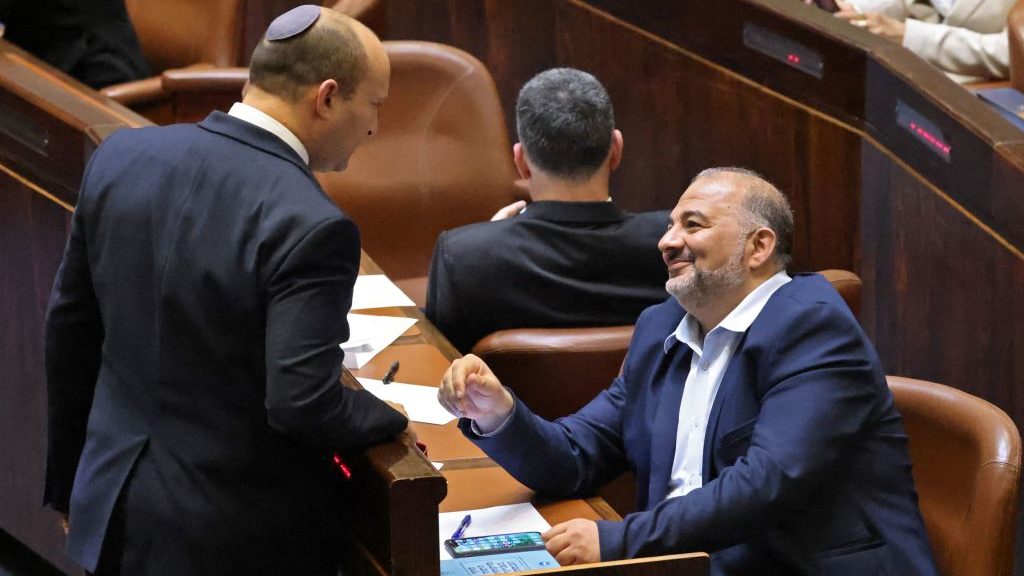Islamic Party Issues Demands to Remain in Israel’s Government
The United Arab List-Raam party, which already suspended its activities in Israel’s Knesset over the current violence in Jerusalem, has destabilized an already fragile government coalition
United Arab List-Raam, the Islamic party supporting Israeli Prime Minister Naftali Bennett’s government coalition, has issued a list of demands to Bennett, and is threatening to quit the coalition if they are not met.
The demands, first reported on Tuesday by journalist Mohammad Majadla of Israel’s Channel 12 news, includes the demand that Israel commit to preserving the status-quo on the Temple Mount, accelerate steps to improve conditions in unrecognized Bedouin villages in the Negev in southern Israel, and provide an official commitment to solve any issues regarding Israeli Arab society which have been delayed by Interior Minister Ayelet Shaked.
By using the term status quo, Raam is broadly referring to the 2014 Jordanian and Israeli understanding witnessed by the United States that says the Al-Aqsa Mosque compound or the Temple Mount is for “Muslims to pray and for all others to visit.”
“The contact with Raam is being handled by the prime minister and minister of foreign affairs, and it’s stable,” a senior member of the coalition told The Media Line. “Raam wants to stay in the coalition, because they understand this government is good for Arab society, and it’s better than any previous government.”
The anonymous lawmaker said that the coalition budgets transferred to Raam to keep its support for the government indicate that “cooperation and understanding that the Israeli government is committed to the Arab society is what guarantees Raam’s support.”
These demands are a message for the voter base, but Al-Aqsa is a really sensitive issue for Arabs, regardless of how religious they are. This matter increases inner tension in Arab society.
As part of the agreement to add Raam to the coalition, the party was promised some 53 billion shekels, or about $16 billion, in budgets for programs to benefit Arab society, spread out over a period of five years. Dismantling the government now could mean the majority of this money will not be transferred to the programs Raam intended to aid Arab society.
Afif Abu-Much, a political analyst and activist from northern Israel, says it is not clear where things will go moving forward.
“There’s really no telling how things will end here. These demands are a message for the voter base, but Al-Aqsa is a really sensitive issue for Arabs, regardless of how religious they are. This matter increases inner tension in Arab society, awakening the conflict between (Raam party head) Mansour Abbas’ choice to join the coalition and the Joint List’s decision not to. If he splits from the coalition now, it might be irreversible,” Abu-Much said. “Abbas himself doesn’t want to split. He was the one who initiated the cooperation with the government in the first place.”
But, Abu-Much adds, “it’s not just up to him. Eventually, it’s the Shura Council’s decision to make.” The Shura Council of the Southern Islamic Movement, the umbrella organization for the party, is the ultimate decision-making body for Raam.
“They may decide not to take part in a coalition responsible for clashes in the Al-Aqsa Mosque, considering how sensitive the matter is for their base,” he said.
Abu-Much estimates about two thirds of Raam members prefer to continue to cooperate and vote with the government and one third would prefer to split.
Interior Minister Ayelet Shaked is now in the spotlight, as several of the aid provisions for Arab society are pending her approval. Shaked has been the most hostile member of the government toward Raam, as she tries to preserve her base of right-wing voters. That is also believed to be the reason that she is the only minister specifically named in Raam’s list of demands.
Both Shaked and Raam party officials refused to speak to The Media Line about the issue.
The government coalition in Israel currently consists of 60 parliament members, after the recent defection of Yamina party lawmaker and Knesset whip Idit Silman to the opposition, leaving an even split of Knesset seats and making the government unusually unstable. Another departure by a coalition member to join in voting with the opposition could lead to the fall of the government.


